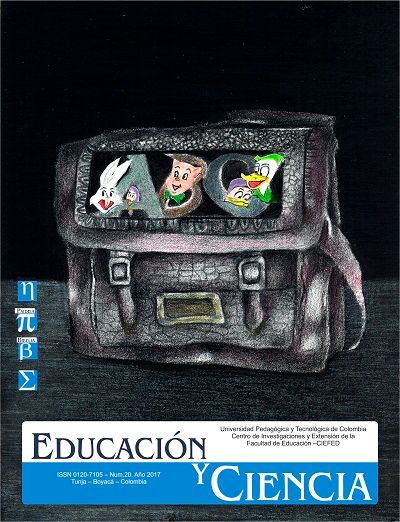Resolution of mathematical problems with fractions focused on the school context

Abstract
This article discloses the partial results of a qualitative approach research of an educational action type, which is aimed at developing a didactic proposal for the teaching of mathematics. The research focuses on the subject of the teaching of solving mathematical problems with fractions, with sixth grade children of the “Carlos Alberto Olano Valderrama” Educational Institution in Belén (Boyacá). The proposal consists of focusing the teaching from the resolution of problems. This proposal has been made in three moments: the first one, the review of background and theoretical discussion; the second, the application and analysis of the results of the diagnostic test; and the third, the design, application and evaluation of the didactic strategy. Obtaining that 60 % of the students appropriated the method satisfactorily, 30 % required more accompaniment and 10 % of the students did not appropriate the method.
Keywords
problem solving, context, didactic strategy, addition and subtraction with fractions, didactics of mathematics, epistemological obstacles.
References
Bach elard, G. (2004). La formación del espíritu científico. En G. Bachelard, La
formación del espíritu científico (pp. 15-26). México: Argos Buenos Aires.
Blanco Otano, B., & Blanco Nieto, L. (2009). Contextos y estrategias en
la resolución de problemas de primaria. Números Revista de la didáctica de las
matemáticas, 71, 75-85.
Cantoral, R., Montiel, G., & Reyes-Gasperini, D. (2015). Base de datos Universidad
Pedagógica y Tecnológica De Colombia. Recuperado de http://biblio.uptc.edu.
co:2092/eds/detail/detail?vid=4&sid=761ed7ca-f12f-4c6a-bc76-accff54fded3%4
0sessionmgr4008&hid=111&bdata=Jmxhbmc9ZXMmc2l0ZT1lZHMtbGl2ZQ
%3d%3d#AN=101800182&db=fua
Cerda, R. S. (2014). UNIVERSIDAD AUTÓNOMA DE NUEVO LEÓN. Impacto
de la resolución de problemas en el rendimiento académico en matemáticas.
Colombia Aprende. (2015). Recuperado de http://diae.mineducacion.gov.co/
siempre_diae/documentos/115087000208.pdf
D´Amore, B., Fandiño, P. M., Marazzani, I., & Sbaragli, S. (2012). La didáctica y la
dificultad en matemáticas. Bogotá: La imprenta Editores S.A.
D’Guzman, M. (2007). Enseñanza de las ciencias y las matemáticas. Revista
Iberoamericana de educación, (43), 19-58.
Elliott, J. (2005). La Investigación - acción en educación. Madrid: Morata.
Giménez, J., & Santos, L. (2013). La actividad matemática en el aula. España: Graó.
Hurtado Orduz, M. E. (2012). Biblioteca Digital de la Universidad Nacional. Recuperado
de http://www.bdigital.unal.edu.co/8573/1/01186688.2012.pdf
MEN. (2006). Estándares Básicos de Competencias. En MEN, Estándares Básicos de
Competencias (p. 184). Bogotá: MEN.
Pino Ceballos, J. A. (2012). Concepciones y prácticas de los estudiantes de Pedagogía Media
en Matemáticas con respecto a la Resolución de Problemas y, diseño e implementación de un curso para aprender a enseñar a resolver problemas. (Tesis doctoral). Universidad
de Extremadura, Badajoz, España. Recuperado de http://dehesa.unex.es/
bitstream/handle/10662/568/TDUEX_2013_Pino_Ceballos.pdf?sequence=1
Polya, G. (2008). Cómo plantear y resolver problemas. México: Trillas.
Rosas Díaz, R., & Sebastián, C. (2008). Piaget, Vygotsky y Maturana Constructivismo a tres
voces. Buenos Aires, Argentina: Aique grupo editor S.A.
Santos Trigo, L. M. (2007). La resolución de Problemas Matemáticos. Fundamentos Cognitivos.
México: Trillas.